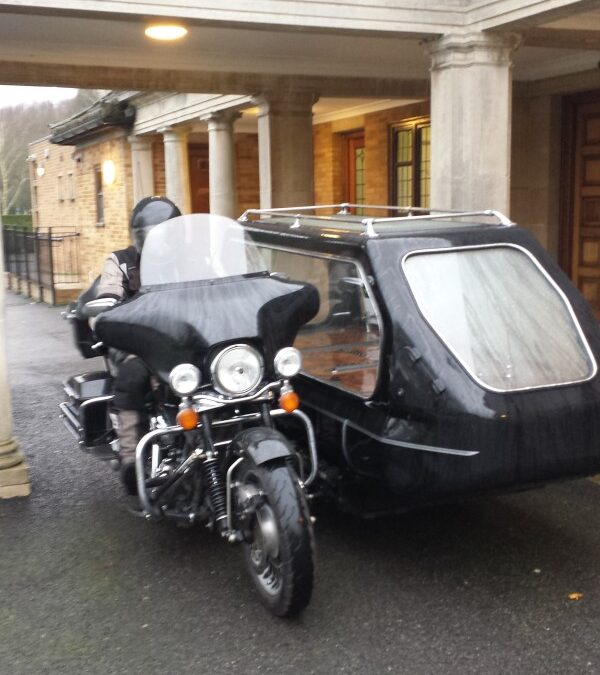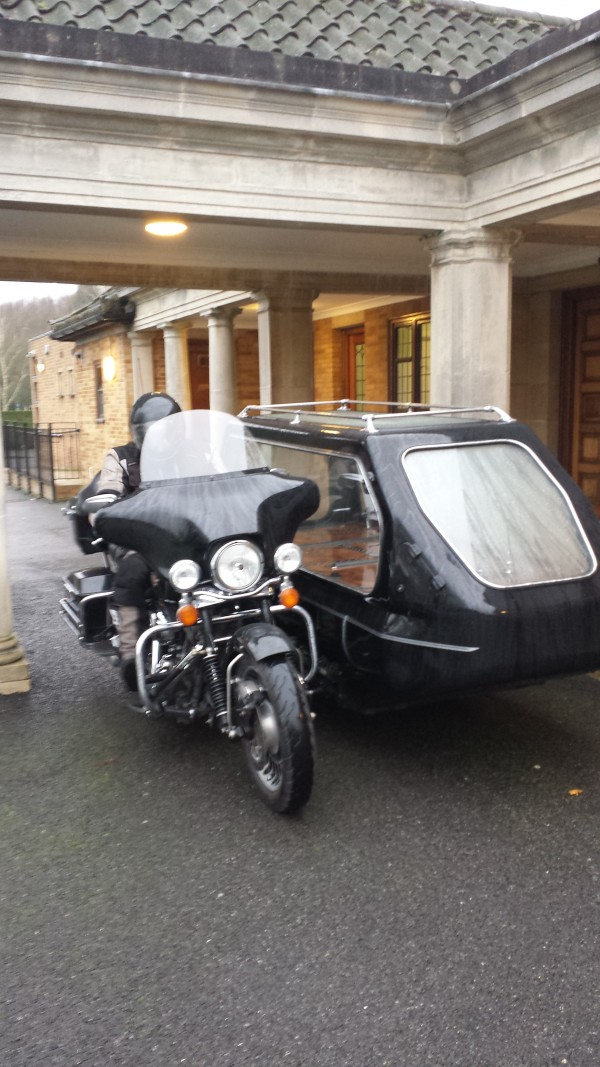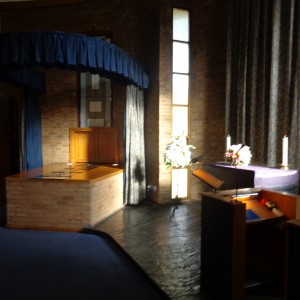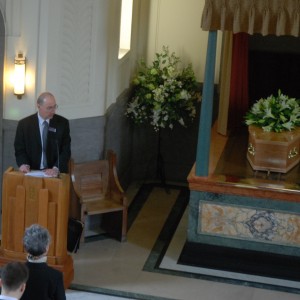
by Michael | Aug 9, 2016 | Blog
We all know the saying, “The only certainty is death.”
Visiting Bereaved Families
As a funeral celebrant, I am only too well aware of its truth. I visit bereaved families as a matter of course, although no two visits are the same.
I don’t go as a counsellor or psychotherapist. I’m not trained for that. I do sometimes give an opinion, when it’s called for, but always explain that it’s a personal opinion only.
At my visits, I see families in various stages of grief. Some are angry, some so sad; others feel responsible in some way for the death. A lot of family members don’t understand what has happened; many feel numb and confused. I remember being baffled by one family (a father, three sons and a daughter) who spent the whole of my visit cracking jokes (often very funny ones!), and making it very hard for me to get anything done. However, when I saw them weeping at the funeral, I understood that that had been their way of coping.
Preparing the ceremony
The purpose of my visit specifically is to help the family draw up a bespoke funeral service that satisfies their feelings (and respects the wishes of the deceased). Some know exactly what features they want; others don’t know what to expect. I talk them through the day, and, where necessary, offer them suggestions and, of course, answer their questions. There are, understandably, often a lot of these.
My families value my experience and, together, we draw up an outline ceremony. This includes the music and whether other participants are to be involved (and how). My aim is to have a full “script” by the day of the funeral, so, once I’ve gone home, basing myself on what I’ve learned during my visit, I source a variety of texts and poems to complete the outline.
I then send this draft as an e-mail to the family, partly so they can check for any errors, partly so they can tell me if they want any readings amended or even replaced.
After a further e-mail or two, the service will have been approved by the family and is ready for me to conduct.
The family will be as ready as they can be for the funeral.

The Eulogy
I have deliberately kept the eulogy till last, although it is usually one of the most important elements. Very occasionally, this is dispensed with (either because not enough is known about the deceased or the latter was considered a nasty piece of work and discretion is preferred!). However, in about 98% of cases, there will be a eulogy, either written and delivered by a close relative or friend or delivered by myself, following my family visit.
In order to produce a successful eulogy, I need to ask the right questions (and heed the answers). I understand that the guests will vary from relatives to friends to former work-mates, so the biography has to paint a rounded picture of the individual. In addition to the dates and headings, anecdotes are essential. A lot of people need to be persuaded that there can be a place for humour in a service (although it will depend on circumstances).
As a guide, four minutes would be the optimal length for this, although that may depend on the individual concerned. There may be tributes as well – ideally, quite personal and also brief.
At the end of the eulogy, I want people to feel that I have been able to capture the essence of the deceased, and that I have (if you forgive the awful metaphor!) put flesh on to the bones of the biography.
Many people surprise themselves during my questioning. They clearly enjoy trawling through their memory banks and remembering some lovely experiences with the deceased.
I know I am very privileged to help people at such a complex and challenging time in their life, and I am so pleased when I get fulsome testimonials after the funeral. It’s a wonderfully satisfying feeling to know that I have been able to make a difference at such a trying time.

by Michael | May 7, 2014 | Blog
A lot of people find it hard to get their head round the fact that I am a funeral celebrant. (With a diploma, to boot.) They think it’s odd enough that I create and lead civil weddings, handfastings, single-sex weddings, vow renewals, ring blessings and baby-namings! But funerals?!! Who’d want to do that?!
I confess that I’d never heard of “civil celebrant” (let alone, funeral celebrant) before I met one not that long ago. When he explained what he did, I was hooked!

So what does a Funeral Celebrant do?
You would normally choose your celebrant according to the amount of spirituality or religiosity you want to include. So your priest could supply the traditional religious service; a humanist would offer a service that may include no religious content at all; a civil funeral celebrant like myself will tailor-make a service to reflect your and your family’s beliefs. It can have the music, readings – also, readers – that you want. Usually, it will be a celebration of life.
The fact is that there is flexibility, and that’s important to know.
Funeral celebrants will either know you already or make an appointment to visit you and find out what your needs are. They will be able to explain what will take place at the funeral and help put your mind at ease. Civil celebrants will question you about your loved one, and try and build up a picture of them for use in the eulogy (assuming there is one).
Ceremonies can be created for funerals at crematoria, cemeteries (natural or otherwise), and also for memorial dedications, graveside tributes or scattering of ashes. I even offer pet funerals!

After meeting you and/or your family and understanding your needs, the funeral celebrant will craft an appropriate service and, usually, e-mail the draft within a couple of days. This is for you to approve in every detail, and I certainly shall willingly rewrite any passages or details that need improvement.
On the day, the celebrant will, of course, conduct the service.
Funeral Directors
In many cases, it is the Funeral Director who recommends clients to Funeral Celebrants. You can book a celebrant independently of a Funeral Director, but I really advise you to find out what is involved before you dispense with them.
Funeral Directors help with the funeral arrangements (including arranging visits of the deceased for the family beforehand, if required, or organising flowers). They also write and place the obituary, prepare the body for burial (including embalming, if necessary), make the music and also transport arrangements, may organise printing of an Order of Service booklet, and bring the body from the hearse (if any) in to the funeral venue.
The Funeral Celebrant will co-ordinate where necessary with the Funeral Director and also with the operatives of the chosen venue. The celebrant takes over, once the body has been brought in. He/she is responsible for the service itself and will deliver the service that has been agreed and approved with the family. He/she also co-ordinates any participation of family or friends in the service.
Is a Funeral Celebrant expensive?
Often, the Funeral Celebrant’s fee is covered by the Funeral Directors’ charges, if it’s a comprehensive service. However, if you arrange a celebrant yourself, you will normally be given a quote before you start working with them. For a single, local booking of about 30 minutes, for a standard service, expect (in 2014) to pay between £160 and £200. This covers the home visit, preparation and conducting of the service.
Expectations
A Civil Funeral Celebrant should create and deliver a meaningful, memorable ceremony that honours and celebrates your loved one, and takes into account your religious beliefs and particular desires and choices. It should be bespoke.
Qualities of a Civil Celebrant
A celebrant will work professionally, with sensitivity and understanding, not only with you but also with relevant funeral professionals. He/she should be able to inform and reassure you beforehand, as well as compile a beautiful service – and be able to present it successfully.
It’s not the easiest of jobs, but the various challenges make it fascinating – and no two ceremonies are ever the same.
It is such rewarding work. I cannot begin to express my satisfaction when the family tells me afterwards that the service was wonderful – just what the deceased would have liked. If guests come up to me, as so often happens, and say that, to their surprise, they actually enjoyed the service, then I know that that was a job well done!
So I hope I have answered the question, “Why become a Funeral Celebrant?”
Michael Gordon can help prepare and conduct a tailor-made civil ceremony in or around London or, indeed, in Europe.
by Michael | Nov 26, 2013 | Blog
A lot of people are surprised when I tell them that one of my remits is funeral celebrant. “Why would you want to do that?” is the most common reaction. Then they tend to ask “What is that, anyway?”
I’ll try to answer both those questions now, in reverse order.
What does a funeral celebrant do?
It may surprise you to learn that funeral and wedding celebrants have much in common. In both cases, after initial contact is made, there is likely to be a face-to-face visit.
When I am with clients (wedding or funeral), this first meeting is vital so that we can get to know each other and see if we feel we can work together.
The clients need to feel they can trust me, that I can answer their questions and make appropriate suggestions, and have their interests at heart. Our goal is to build a service or ceremony that suits their needs and desires. I want them to like me and to feel confident in my all-round professionalism.
I ask a lot of questions too. Partly, this is to determine the sort of service or ceremony I am to write and conduct and also the sort of readings, music, ‘choreography’, register, language and style desired. Should it be informal or formal, religious, part-religious or non-religious?
Questions also enable me to build up a picture of the person or persons the ceremony is focusing upon for any address I may make on the day.
Once taken on, I write a draft of the service, which can be amended by the client (possibly, several times). The idea is to ensure that it is memorable and unique.
Why would anyone want to be a funeral celebrant?
Obviously, dealing with bereaved people can be difficult. Each client is different, and I have to tailor my visit accordingly. Often, clients are confused and apprehensive, but I can quickly put their mind at rest by answering their questions and explaining the options they have. They have an opportunity to speak about the deceased, which they often enjoy.
Our meeting can be rewarding on both sides, and, hopefully, by the time I have left, we can be sure that we can work together to write a service that will honour the deceased, permit grieving, but also be a celebration of a life. It should also fit in with the beliefs of the deceased and, if possible, the family.
Choosing the readings and writing an eulogy are tasks that are challenging, but often very rewarding. Usually, the client is happy with the service I submit to them (there will be a few minor changes, of course), and every detail – who is reading what, who comes in with the coffin, what music is played when, etc. – is agreed beforehand.
Before the service, I introduce myself to as many of the mourners as possible (having checked with the authorities that all is set up). I take pride in my presentation skills, so conducting the funeral service is not as scary for me as people imagine! I take nothing for granted,though!
After the service, I often have clients and mourners come up and say that they actually ‘enjoyed’ the service and felt it did the bereaved justice, and that he/she would have wanted it like that.
Mission accomplished!
So, you see, there’s a lot about this work to love.
Michael can help plan your funeral service in your lifetime.
Michael Gordon can help prepare and conduct a tailor-made life-cycle ceremony in or around London or, indeed, in Europe.




